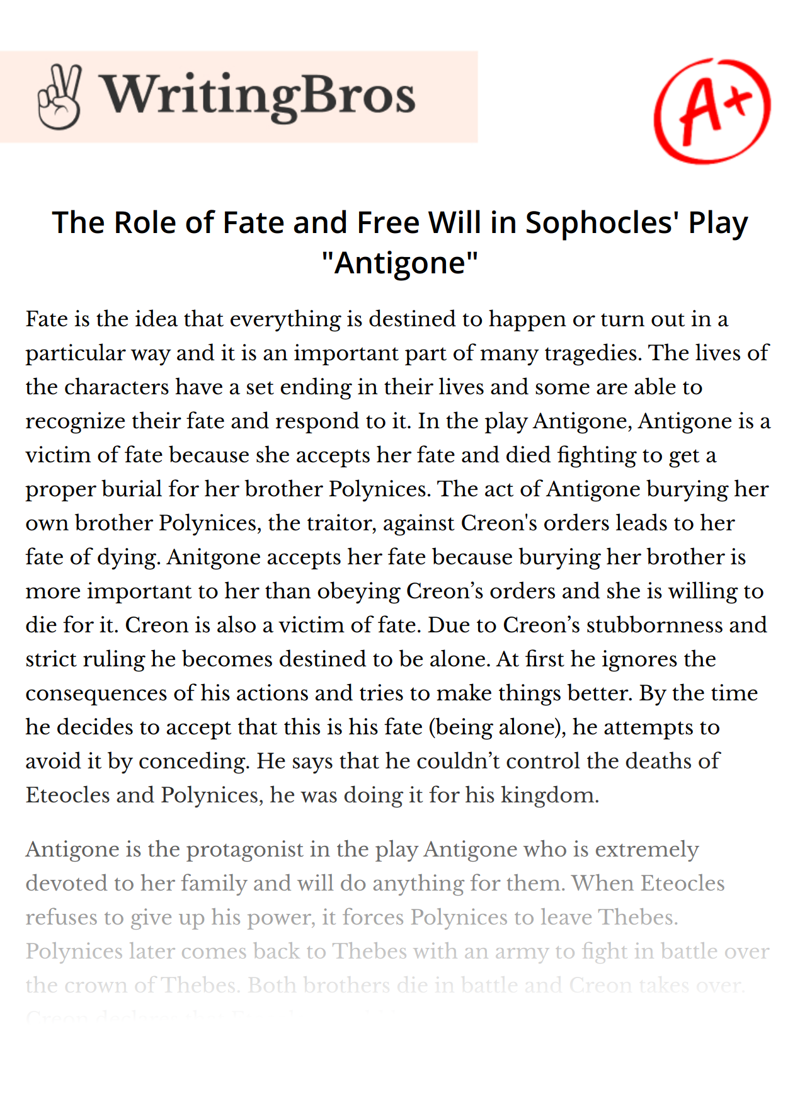The Role of Fate and Free Will in Sophocles' Play "Antigone"

Fate is the idea that everything is destined to happen or turn out in a particular way and it is an important part of many tragedies. The lives of the characters have a set ending in their lives and some are able to recognize their fate and respond to it. In the play Antigone, Antigone is a victim of fate because she accepts her fate and died fighting to get a proper burial for her brother Polynices. The act of Antigone burying her own brother Polynices, the traitor, against Creon's orders leads to her fate of dying. Anitgone accepts her fate because burying her brother is more important to her than obeying Creon’s orders and she is willing to die for it. Creon is also a victim of fate. Due to Creon’s stubbornness and strict ruling he becomes destined to be alone. At first he ignores the consequences of his actions and tries to make things better. By the time he decides to accept that this is his fate (being alone), he attempts to avoid it by conceding. He says that he couldn’t control the deaths of Eteocles and Polynices, he was doing it for his kingdom.
Antigone is the protagonist in the play Antigone who is extremely devoted to her family and will do anything for them. When Eteocles refuses to give up his power, it forces Polynices to leave Thebes. Polynices later comes back to Thebes with an army to fight in battle over the crown of Thebes. Both brothers die in battle and Creon takes over. Creon declares that Etecoles would have a proper burial but Polynices would not because he was a traitor to Thebes. Antigone is unable to accept this because of her strong loyalty to her family and insist they need to bury her brother because it is an offense to the Gods to leave a family member unburied. She is dedicated to making sure Polynices gets a proper burial and thinks it is her moral duty to do so. Antigone decides to bury her brother, Polynices for all to see which defies Creon's orders. She later begins to accept her fate that she is going to die for her brother.
Ismene argues with Antigone because she doesn't think it is a good idea to go against Creon's orders and she informs Antigone of the consequences of this act. Antigone considers the consequences of dying for her brother and goes against Creon's orders anyways which leads to her fate, dying. Antigone accepts her fate and is not afraid of what is meant to happen. She knows what the fate of her family has led to and is not afraid to do what she believes is right. Antigone fully understands her fate and accepts it. She believes following her fate is more important than following Creon's laws. Antigone says ¨Fear not for me; guide thine own fate aright.̈ Antigone must follow the fate of burying her brother and drying for him that has been decided by the Gods and she isn't going to fight it. Even when she is taken by the Gods to be put in the cave she says, ̈but for my fate no tear is shed ̈. Antigone fully accepts her fate as we can see because she doesn't even wait to be killed but instead kills herself in the cave which ensures that her fate is sealed. She is a victim of fat because she never tries to change her fate but rather accepts it. Antigone knows that the Gods have spoken so she must obey.
Creon is also a victim of fate because after being extremely stubborn and strict with his laws, he causes many deaths around him which makes Creon destined to be alone. He ignores the consequences of his actions and tries to correct his wrongs but is too late. By the time he decides to accept his fate to be alone, he attempts to avoid it by acknowledging what he did by conceding. It is too late though, Antigone and Haemon have already killed themselves and it is due to his strict and reluctance to change his ideas. Creon is a victim of fate because he could not control the spontaneous deaths of Eteocles and Polynices and he argues as rightful heir that he is doing right by his kingdom Throughout the play, he is unwilling to listen to others about the warnings of his fate throughout most of the play resulted in it becoming his reality.
For many characters in Antigone, their fates turn out to be inevitable, whether it is because they accepted this fate like Antigone and allowed it to come true or refuses to acknowledge until it was too late like Creon.
Cite this Essay
To export a reference to this article please select a referencing style below

